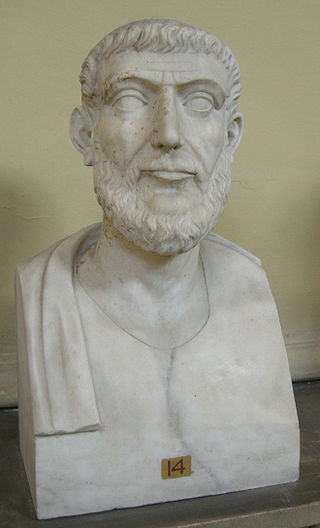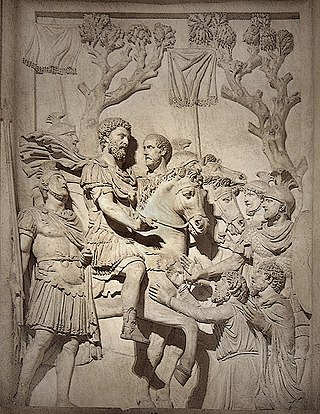Related Research Articles

Antonia the Elder was a niece of the first Roman emperor, Augustus, being the eldest daughter of Octavia the Younger and her second husband, the Triumvir Mark Antony. She married Lucius Domitius Ahenobarbus and became the paternal grandmother of the emperor Nero.

Appius Claudius Caecus was a statesman and writer from the Roman Republic. He is best known for two major building projects: the Appian Way, the first major Roman road, and the first aqueduct in Rome, the Aqua Appia.

The gens Claudia, sometimes written Clodia, was one of the most prominent patrician houses at ancient Rome. The gens traced its origin to the earliest days of the Roman Republic. The first of the Claudii to obtain the consulship was Appius Claudius Sabinus Regillensis, in 495 BC, and from that time its members frequently held the highest offices of the state, both under the Republic and in imperial times.

Tiberius Claudius Pompeianus was a politician and military commander during the 2nd century in the Roman Empire. A general under Emperor Marcus Aurelius, Pompeianus distinguished himself during Rome's wars against the Parthians and the Marcomanni. He was a member of the imperial family due to his marriage to Lucilla, a daughter of Marcus Aurelius, and was a key figure during the emperor's reign. Pompeianus was offered the imperial throne three times, though he refused to claim the title for himself.
Appius Claudius Pulcher was a Roman patrician, politician and general in the first century BC. He was consul of the Roman Republic in 54 BC. He was an expert in Roman law and antiquities, especially the esoteric lore of the augural college of which he was a controversial member. He was head of the senior line of the most powerful family of the patrician Claudii. The Claudii were one of the five leading families which had dominated Roman social and political life from the earliest years of the republic. He is best known as the recipient of 13 of the extant letters in Cicero's ad Familiares corpus, which date from 53 to 50 BC. They do not include any of Appius' replies to Cicero. He is also well known for being the older brother of the infamous Clodius and Clodia.
Appius Junius Silanus, whom Cassius Dio calls Gaius Appius Silanus, was consul in AD 28, with Publius Silius Nerva as his colleague. He was accused of majestas, or treason, in AD 32 along with a number of senators, but he and Gaius Calvisius Sabinus were saved by one of the informers, Celsus, a tribune of a city cohort.
Gaius Claudius Pulcher, consul in 177 BC, was the son of Appius Claudius Pulcher, consul in 212 BC, and he was the father of Appius Claudius Pulcher, consul in 143 BC.
Cornelius Repentinus was a Roman Senator who was active in the 2nd century AD. He held a number of positions during the reigns of emperors Marcus Aurelius, Commodus and Didius Julianus, which included suffect consul and Urban prefect of Rome.
Gnaeus Claudius Severus was a Roman senator and philosopher who lived in the Roman Empire during the 2nd century AD.
Marcus Silius Messala was a Roman senator and suffect consul towards the end of the 2nd century. In 193, Messala was the suffect consul from May until June. He was in command of the location where the murder of Pertinax took place. Septimius Severus accused Messala of murdering Pertinax and using his influence to convene and order the Senate to install the Senator Didius Julianus as Emperor. Septimius Severus called the death of Didius Julianus divine providence and ordered the execution of Messala.

Tiberius Julius Celsus Polemaeanus, commonly known as Celsus, was an Ancient Greek military commander and politician of the Roman Empire who became a senator, and served as suffect consul as the colleague of Lucius Stertinius Avitus. Celsus Polemaeanus was a wealthy and popular citizen and benefactor of Ephesus, and was buried in a sarcophagus beneath the famous Library of Celsus, which was built as a mausoleum in his honor by his son Tiberius Julius Aquila Polemaeanus.
Appius Claudius Pulcher was a Roman politician. An early supporter of Augustus, he was elected consul in 38 BC.
Titus Flavius Claudius Sulpicianus was a Roman statesman who served as Senator and Consul suffectus. He unsuccessfully attempted to succeed his son-in-law Pertinax as Emperor in 193.
Lucius Hedius Rufus Lollianus Avitus was a Roman senator and military officer. He was consul in the year 144 as the colleague of Titus Statilius Maximus.
Titus Sextius Cornelius Africanus, also known as Titus Sextius Africanus, was a Roman Senator who lived in the Roman Empire in the second half of the 1st century and first half of the 2nd century. He served as an ordinary consul in 112 as the colleague of emperor Trajan.
Lucius Ragonius Venustus was an aristocrat of the Roman Empire. He was appointed consul ordinarius in 240. X. Loriot describes Ragonius Venustus as an example of the "new generation of clarissimi" that emerged under the reign of Alexander Severus. As the son and grandson of consuls, he attained the consulate without necessarily having served as military tribune, legate of a legion, or provincial governor, unlike his colleague Gaius Octavius Appius Suetrius Sabinus.
Tiberius Claudius Julianus was a Roman senator and literary figure who held several offices in the imperial service during the later second century AD. He was suffect consul during the nundinium of September-October 154 with Sextus Calpurnius Agricola as his colleague.
Julianus is the cognomen of a Roman senator whose tenure as suffect consul with one Castus as his colleague, is known from a number of brick stamps. A number of experts have surmised he is to be identified with a proconsul of Asia mentioned in the writings of the sophist Aelius Aristides.
Tiberius Claudius Sacerdos Julianus was a Roman senator of the second century. He was suffect consul in the nundinium of November-December AD 100 with Lucius Roscius Aelianus Maecius Celer as his colleague. Julianus is primarily known from inscriptions.